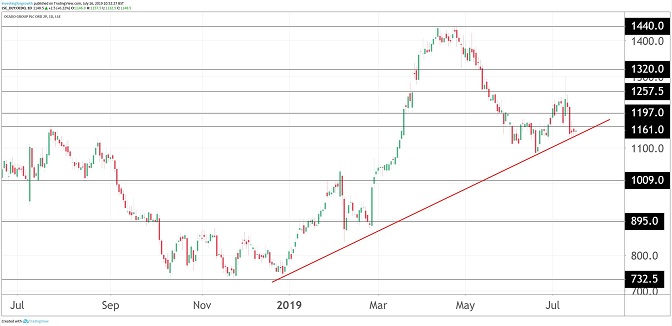Stockwatch: Is Britain's answer to Amazon still a 'buy'?
Our companies analyst reveals what he’d do next with this hugely successful share tip.
16th July 2019 10:20
by Edmond Jackson from interactive investor
Share on
Our companies analyst reveals what he'd do next with this hugely successful share tip.

Did I get lucky, advancing FTSE 100-listed Ocado (LSE:OCDO) as a long-term 'buy' at 525p back in January 2018, re-iterating this at 800p four months later, despite manifest overvaluation?
Now at around 1,150p, down from a 1,435p peak last April, is this a chance to consider adding or buy afresh – if the rationale is intact, this is a global retail technology giant in the making?
Since listing nine years ago it now seems that short sellers have given up trying to discredit Ocado as an over-hyped logistics firm on thin margins: the extent of stock on loan has fallen from 21% to 13.5% in January 2018, and is currently just 1.2% of the issued capital.
While buying back may have contributed to a volatile rally, you could say it has left speculators to gorge on a momentum in fantasy value: latest interim results show Ocado slipping into losses after a few years of miniscule EPS. The stock even rose about 7.5% to 1,260p in response to the results, though has given this back.
My sense was that logistics services set the context also for driving technology deals with major food retailers internationally, as they pivot towards the "online supermarket". Broadly, this is being delivered as with Marks & Spencer (LSE:MKS) deal unveiled last February. Applying Ocado's smart platform IT to the M&S branded food and drink range will "transform online grocery shopping in the UK," we're told. However, this is chiefly a substitution deal with effect from September 2020 to replace the current one with Waitrose.
- FTSE 100's best and worst performers in 2019 so far
- Why Ocado shares have been chased sharply higher
- ii view: Ocado revenues growing fast
Results published this year are a mixed bag
Results for the year to 2 December 2018 didn't exactly wow financially: retail revenue advanced 12%, although operating profit rose by a more modest 4.2% to £85.2 million. Mind how Ocado is prone to emphasise performance selectively, e.g. on the Solutions side that everyone is watching, cash fees from its partners advanced 37% to £200 million, while the divisional performance table shows revenue up a more modest 15.8% to £123 million and the operating loss widening from £6.6 million to £17.9 million, as distribution/admin costs soared 25% to £140.9 million.
Cost rises were chiefly a two-thirds hike in admin costs, linked to increased headcount to support the IT platform and international clients. That meant a £31.9 million group operating loss versus a £5.4 million profit in 2017, which, after finance costs, meant a £44.4 million pre-tax loss for 2018 versus an £8.3 million loss in 2017.
So, it was left to the CEO's narrative to sustain enthusiasm: a reminder of deals with Sobeys, ICA and Kroger to develop Ocado's smart platform in Canada, Sweden and US – utilising software, algorithms and robotic infrastructure.

Source: TradingView Past performance is not a guide to future performance
First-half 2019: below expectations, and a warning
Half-year results show 9.7% retail revenue growth and 20.6% growth for solutions, the highlights again a bit cute – citing fees invoiced regarding solutions' partners up 36% and those for international partners nearly doubling.
It can seem as if somewhat "borrowing from the future" to try and justify Ocado's valuation, where the accounted figures might otherwise imply a more typical growth rating around 20x price/earnings (PE). Here, we don't even have a PE: the adjusted like-for-like pre-tax loss has jumped to £43 million from £12.9 million, or to £142.8 million after a £99 million raft of exceptionals. February saw a fire at one hi-tech warehouse, but this was covered by insurance and only chipped sales by 2%.
Even at the EBITDA level (which approximates to operating profit) level, and which companies like to emphasise, £18.1 million before exceptionals appears below-consensus for about £26 million. So, although retail growth guidance for 10-15% in the second half remains unchanged, the first half performance adds up to a profit warning – considering also, the outlook statement cautions about a loss of fees from a Morrisons' "holiday" on capacity at Erith, on the solutions side, also £15-20 million additional costs for warehouses (or “customer fulfilment centres) and the IT platform.
So, there's been more emphasis on the narrative, which has evolved to "leveraging our technology expertise to support new opportunities for customers and partners" such as automated meal preparation and "vertical farming" – a majority stake in the largest such farm in Europe and a small 80-acre venture in the US – where the aim is to revolutionise the concept of grocery, delivering produce to kitchens within an hour of being picked.
| Ocado Group - financial summary | ||||||
|---|---|---|---|---|---|---|
| year ended 2 Dec | 2013 | 2014 | 2015 | 2016 | 2017 | 2018 |
| Turnover (£ million) | 792 | 949 | 1,108 | 1,271 | 1,455 | 1,599 |
| IFRS3 pre-tax profit (£m) | -12.5 | 7.2 | 11.9 | 12.1 | -8.3 | -44.4 |
| Operating margin (%) | 0.3 | 1.8 | 1.9 | 2.1 | 0.0 | -2.1 |
| IFRS3 earnings/share (p) | -2.2 | 1.2 | 1.9 | 2.0 | -1.4 | -6.9 |
| Cash flow/share (p) | 10.5 | 13.0 | 15.5 | 17.7 | 18.8 | 15.3 |
| Capex/share (p) | 13.2 | 13.5 | 16.8 | 20.8 | 28.7 | 24.3 |
| Net tangible assets per share (p) | 28.4 | 29.0 | 30.2 | 29.0 | 39.3 | 59.2 |
| Source: historic Company REFS & published accounts |
Capex/balance sheet raise a funding question
Cash has reduced to £360.1 million from £447.6 million, but is supportive of £350 million capital expenditure guidance, versus stable long-term debt around £245 million. Total capex during the first half has been £112.2 million versus £101.6 million like-for-like in 2018.
Notes to the accounts on capex cite £350 million as the total amount expected for 2019. comprising "continued investment in infrastructure and technology solutions, implementation to international partners, new warehouses...etc".
Meanwhile, net operating cash flow decreased from a £38.1 million inflow to £8.6 million outflow; so, looking a year or two out, it would appear that unless the financial dynamics alter then Ocado will need to raise further capital.
One aspect I don't like in the balance sheet is the differential between trade payables - up 50% to £377.5 million - versus trade receivables of £144.8 million, although receivables rose near-similarly. My regular gripe being that companies don't explain such a gap, which can raise doubts about whether profits are being enhanced or losses mitigated by lengthy payment terms.
Even so, I incline broadly to a 'hold' stance
The net consideration of such essentials is Ocado being an especially risky stock to hold if market fundamentals are deteriorating. By now you really want to see the solutions side proving the hopes that management entertain, with solid bread-and-butter profits, not another dollop of jam tomorrow.
Unsurprising, therefore, the market price is down about 17.5% on April’s high that followed an agreement with Coles, one of Australia's largest retailers, to develop its online grocery business – with circa £560 million equivalent, annual revenues – using Ocado's smart platform and warehouses.
If markets do go into the late-cycle fall much-entertained by experts – with corporate profits crimped, tough international trade and central banks unable to make much difference given interest rates are so low already – then Ocado is the kind of stock to get hit. The second half of 2018 saw it down 30% from a similar level as today, to about 770p at year-end. But even if a recession follows, the stock could appeal on relatively unique growth criteria of a grocery revolution, versus so many other companies under pressure. Ocado has genuine traction with retailers globally.
Sentiment-wise, it appears that hedge funds have conceded defeat in their long-standing siege of the stock, which is not to say it isn't fundamentally overvalued, but once seriously bitten this community will be twice-shy at resuming such an attack. It does tend to collective behaviour.
The stock price equilibrium that's followed prelims and interims' is broadly disappointing by way of numbers, suggesting quiet acceptance by the market that Britain's answer to Amazon (NASDAQ:AMZN) is steadily taking form. Critics point out how Amazon was so highly valued "but has never made a profit", ended up eating humble pie.
The true test looks as if it will come as and when Ocado may need to raise more equity capital, being forced to justify its business model and prospects by way of projections rather than a jam tomorrow narrative that it's getting way with currently.
Best avoid this stock if you are a conservative investor mindful of capital preservation on any timescale. But if you are diversified with a long horizon, take a five to ten-year view and hang on. Look to buy the drops. Hold.
Edmond Jackson is a freelance contributor and not a direct employee of interactive investor.
These articles are provided for information purposes only. Occasionally, an opinion about whether to buy or sell a specific investment may be provided by third parties. The content is not intended to be a personal recommendation to buy or sell any financial instrument or product, or to adopt any investment strategy as it is not provided based on an assessment of your investing knowledge and experience, your financial situation or your investment objectives. The value of your investments, and the income derived from them, may go down as well as up. You may not get back all the money that you invest. The investments referred to in this article may not be suitable for all investors, and if in doubt, an investor should seek advice from a qualified investment adviser.
Full performance can be found on the company or index summary page on the interactive investor website. Simply click on the company's or index name highlighted in the article.
Disclosure
We use a combination of fundamental and technical analysis in forming our view as to the valuation and prospects of an investment. Where relevant we have set out those particular matters we think are important in the above article, but further detail can be found here.
Please note that our article on this investment should not be considered to be a regular publication.
Details of all recommendations issued by ii during the previous 12-month period can be found here.
ii adheres to a strict code of conduct. Contributors may hold shares or have other interests in companies included in these portfolios, which could create a conflict of interests. Contributors intending to write about any financial instruments in which they have an interest are required to disclose such interest to ii and in the article itself. ii will at all times consider whether such interest impairs the objectivity of the recommendation.
In addition, individuals involved in the production of investment articles are subject to a personal account dealing restriction, which prevents them from placing a transaction in the specified instrument(s) for a period before and for five working days after such publication. This is to avoid personal interests conflicting with the interests of the recipients of those investment articles.